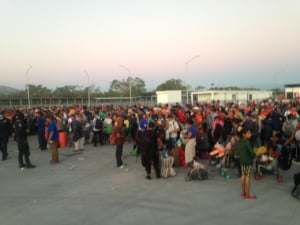
Thousands from the Honduras refugee caravan left Mexico City starting Nov. 9, with many arriving in Irapuato and Celaya, in the state of Guanajuato, between Nov. 10 and 11. From there in the pre-dawn hours of Nov. 12, they continued directly westward to Guadalajara, double the amount traveled the day before, about 150 miles, with the majority of them settled in Benito Juarez Auditorium by Nov. 12.
Guadalajara, first communication from the caravan
In large part, the people have been moving trucks and buses in solidarity with the caravan. Approximately 1,000 arrived in Guadalajara, Jalisco state, the night prior, while the rest, 4,000, arrived in Guadalajara Monday, Nov. 12.
In Guadalajara, the caravan released their first press release. In it, they declared that the Central American migrant exodus must be recognized as a humanitarian crisis. They requested the implementation of the “Global Compact for Safe, Orderly and Regular Migration,” so as to preserve the lives of migrants throughout their travels. To fulfill the request, the statement demands, “Guaranteeing buses so that we arrive safely to our final destination, thereby protecting women and children, who have to endure lower and lower temperatures, amongst other threats to their lives.”
Additionally, they stated that due to the UN, the UN High Commissioner for Refugees, and the UN’s International Organization for Migration not treating the Central American diaspora as a humanitarian crisis, the caravan members are “unable to recognize and forced to reject any accompaniment coming from these institutions, due to their double standard.” In conclusion, they appreciated “local authorities who acted with solidarity and without discrimination, and especially thank the community members, our Guatemalan and Mexican sisters and brothers who have offered us food, water, shelter and dignified treatment, supplanting the work that should be carried out by institutions and governments.”
The morning of Nov. 13, the Jalisco government cooperated with bus transportation for the caravan to the state border of Nayarit. There the Nayarit state government was to pick them up with about 50 buses to move them northeast to the state of Sinaloa.
Nayarit a few weeks ago suffered the destruction of over 100,000 homes, an estimated $10 million in damages and losses, due to Hurricane Willa. The state was not able to shelter the refugees, and decided to request federal help to help move the caravan through the state, to save resources for their own citizens. However, the caravan was left in Arenál, Jalisco, about 55 miles from the agreed-upon transfer point. The caravan at 7 a.m. sent a second communication, where they denounced the government of Jalisco for leaving them in a solitary and dark area, and putting at risk the physical health and security of thousands of families and over 2,000 children. From there, many continued walking towards the point where buses were being organized to transport them to La Concha, Sinaloa, which lies some 190 miles away.
Dispersed between Tijuana and Nayarit
In La Concha, a transit center, the refugees set up their own improvised resting area. A few hundred arrived the night before, and the rest of caravan arrived early Nov. 14. This would be their sole and brief stay in Sinaloa territory, for they would go directly to Navajoa, Sonora. This would be the longest leg of their entire trip, a total of about 430 miles. From Navajoa, they continued in rides, while the majority of families traveled by buses from Sonora and Sinaloa.
From Navajoa, it would be direct to Tijuana, Baja California, a distance of 720 miles.
The earlier part of the caravan began to arrive on Tuesday, Nov. 13, in Tijuana. The LGBTQ contingent was the first arrival. As of Nov. 16, Friday evening, the total number of caravanistas in Tijuana is about 2,400.
The rest of the caravan is spread out, seeking bus transport between the states of Sonora, Sinaloa and final destination of Baja California and border town of Tijuana,
In the late evening of Thursday, Nov. 15, two buses were pulled over by federal police and Mexican National Immigration. The authorities moved the group to Hermosillo, where they were threatened with possible deportation. As they drove to the deportation facility, the refugees were denied food and bathroom breaks. The human rights commissioners of several states, who have been following the caravan since they entered Mexican territory, immediately took action and invoked the right of refugees seeking asylum: They cannot be deported, in particular the children aboard the buses.
The next morning near Sonoyta, Sonora, a town bordering Arizona, there was an accident involving one bus and a federal police vehicle. A group of 11 refugees were moved to the nearby hospital. All had minor injuries.
The refugees continue to arrive in Tijuana after traveling more than one month, over 2,600 miles. Some 600 remain in Mexico City but are due to depart in one or two days. All the caravan refugees seek asylum in the United States after fleeing state and police repression, as well as violence from organized crime in their home countries, and crushing poverty. Tijuana is one of the main ports of entry at the U.S.-Mexico border. There are already thousands of refugees and asylum seekers, from Haiti to Central America, who have been awaiting asylum and refuge for several years.
In response and solidarity, progressive organizations from all sectors are mobilizing to provide support in the United States and demand the caravanistas’ and other immigrants’ safe and swift entry. Liberation News and the Party for Socialism and Liberation are an integral part of this struggle. There are no borders in the workers’ struggle!





